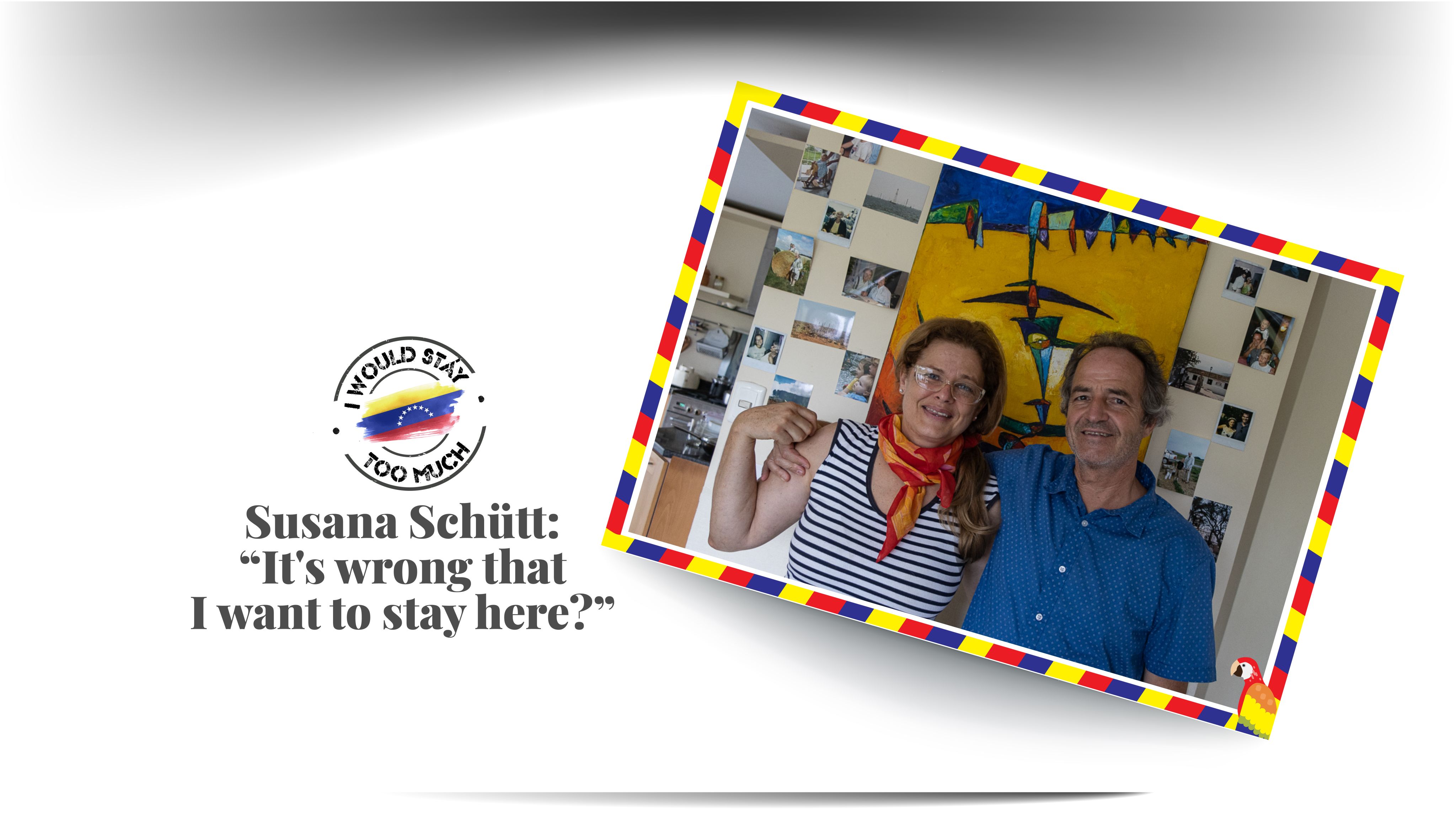
Susana and her husband have been living the last 24 years in Venezuela. They decided to migrate to the Caribbean country for the nice weather and the warmth of its people. Of course, good opportunities are now scarce. They know they have many reasons to return to Germany, but they always find a reason to stay
By Grisha Vera

Susana Schütt, 57-years-old, prepares the table on her patio. She insists on talking there. "It seems like it's going to rain. But the view is so cute."
And it is. From the terrace, you can see how the green of the mountains meets the sky. The landscape is one of the many you can enjoy throughout Venezuela: imposing mountains, part of the roads, and towns. For Susana, the vegetation and the weather are two of the many reasons she does not want to leave the country.
Susana was born in Stuttgart, Germany, and she arrived in Venezuela for the first time when she was 12 years old. Her father was from Bolivia, descended from Germans, who migrated to that country for college.
He decided to return to America, but he could not stay in Bolivia due to political persecution. He chose Venezuela as his destination. He arrived in 1976 and decided to stay.
He was a mechanical engineer and worked at the Venezuelan Institute for Scientific Research (IVIC by its acronym in Spanish) in the thermodynamics department.
Susana lived her adolescence near Caracas, and when she finished high school, she returned to Germany.
A half-decade later, in 1997, she came back. Although she said it wasn't her decision, Michael has fallen in love with Venezuela. In 2001, according to the figures of the National Statistics Institute, 3.926 Germans were living in the country.
They fled from winter
The dining room of Susana has a large window where you can see the mountains. While they observe the rainy afternoon, she and Michael say that weather is one of the things that they love from Venezuela.
Susana is an architect, and Michael is a geophysicist. He works at Funvisis (Venezuelan Foundation for Seismological Research by its acronym in Spanish). He is also a professor at the Venezuela Central University and the Simon Bolivar University. Susana spent more than a decade raising her children and now teaches German.
They met in Berlin when they were college students, thanks to the Bolivian community. Susana's link to this group was her uncle, and Michael's was his professional interest in South America.
–His projects were in winter, in South America –Susana tells– And I used to stay alone for three months in Berlin. I suffered a lot because of the darkness and the cold. We came to visit my parents, and well, this one fell in love from Venezuela, and he brought me back.
Well, it wasn't so difficult to convince her –Michael added.
A year later, to arrive in the country, they had their first son. They decided to become parents after migrating to Venezuela.
–He says that we owe our children to Venezuela. I did not have that maternal feeling in Germany.
–We wouldn't have had all three children –Michael insists.
–Not all three, maybe just one child–
Susana clarifies immediately- Here, people were so different with children, that moved us a lot. Even the men. There, you have never seen a man carrying a baby and saying, "Oh! what a cute baby." The atmosphere in Germany towards children was contemptuous, especially in Berlin, where we lived.
–Well, it is this thing of human quality that ties us here. Despite all the problems and circumstances that we know, that human quality still exists in Venezuela. And we like the way of being of the Venezuelans –Michael comments.
But, the Venezuelan human quality was not enough for the three children of the couple. Neither does the weather.
All three made the same decision their mother made when she left High School: return to Germany.
Susana says that her children feel they cannot have a future in Venezuela. And she regrets having to agree with them. She says the universities do not have the resources and the services necessary for their operation, for example, current water in the bathrooms.
To the oldest one –Michael says– A year before graduating, I asked him: "Do you feel German or do you feel Venezuelan?" I was so happy when he said that he felt Venezuelan.
The balance remains in favor of Venezuela
The plan of Michael and Susana when they migrated to Venezuela was to live in the Caribbean country and spent the vacations in Germany.
But for a decade, the economic situation in Venezuela has not allowed them to fulfill their plans. Now, they try to visit their country at least once every three years. Like many Venezuelans, Michael and Susana have wondered if it is best to plan their lives outside the country.
–We always put the pros and cons, –Susana says– This has been our home for the last 20 years, and to say goodbye to that is difficult. Sure, the quality of life has been going down and down. The insecurity issue is terrible.
–Yes, but that was years ago. It's a little better now –Michael argument– It is also a matter of perception, is not an exact science about violence and insecurity. Back in the 90s, they told us: "You can't do this."
–Is a delicate issue- Susana warns- When we arrived in the 70s, people already told us how terrible everything was: that they assaulted you, kidnapped you, it was always an issue.
–Apart from a few small things, we have not suffered.
–We knock on wood- Susana says while tapping her table gently– because I have thought that if some violence, kidnapping, or something like that happens to us, then if one would think about it if they wanted to stay. That has been the factor why many friends have left the country.
Right away, Michael intervenes with the idea that promises to be the basis for his decision to stay in Venezuela.
–But you must think that when you leave a country, you usually do it when you are young. Maybe, we are not Venezuelan citizens, but this is our country. We had 35 five years when we came. I have developed professionally, and the truth is that I have made it cool. Compared to many of my colleagues who have had to emigrate because they were not earning anything. I have been able to live a little from the savings we had.
–Living here is a luxury for us –Susana says– I mean, it is a luxury to live in the country that we like, pay it with our savings, and not receiving anything from what we work to live here.
Susana and Michael recall that the economic situation in Venezuela began to affect them in 2011. Three years later, Michael chose to go to Ecuador with a scholarship to save and support his family in Venezuela. At that moment, they envisioned the possibility of migrating to Ecuador.
–We asked ourselves, "Are we going to Ecuador?" And we said No. Why not? Because it is not Venezuela. It is not the same weather or the same landscapes. It is not the same people. I mean, this is ours.
Go back to Germany also has been an option on the table. But Susana and Michael always find a "but" to the decision to leave; they say that it is not easy to get a job at their ages in their field of work in the European country. They would have to dedicate themselves to something else. Although Germany is always the option for economic salvation, they assure that they have no needed to leave.
Susana doubts that they can experience a re-boom in Venezuela. But this does not prevent them from continuing in the country. To feel less insecure and be able to meet their needs are not the only reasons to stay. To support education is another reason, although they warn that it is not an easy task. She teaches German to professional workers, and unintentionally, she helps them to leave the country. On the other hand, Michael trains geophysicists who do not have job opportunities because the fall of the oil industry limited their options.
–We are training people in Venezuela for the world, not for Venezuela. And that hurts us a lot.
Michael and Susana have thought a lot about leave or stay. They have as many reasons to be in Venezuela as to flee. But, being German, they still wonder if they ask. It seems that the surrounding others cannot see all the arguments they have to follow, to thank and trust that things will change.
–It catches my attention –Susana comments– that, lately, many people who recognize us as foreigners see us in the streets and ask: Why are you still here? Why don't you go? Many have been intimidated, extorted. So those people grabbed their things and left. Even Venezuelans of German descent, but born and lived all their lives here. The despair is so great. Could it be that we are wrong? I mean, I've wondered many times watching the herd leave. It's wrong that I want to stay here?
After a brief silence, Susana concluded:
–No. I think we are right.
